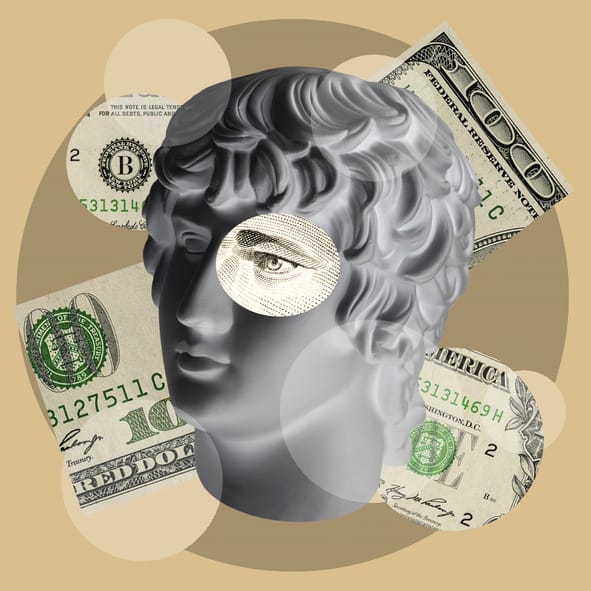A recent report from the National Bureau of Economic Research finds that the inequality of wealth between the top one percent of households and everyone else has become greater that at any time in the past 50 years.
To illustrate, imagine a pizza representing total U.S. wealth divided into tenths. The richest one percent of households would own four slices. Others in the top 20 percent would own five slices. Everyone else would share only one slice. The poorest 20 percent have a negative net worth and so would get nothing.
Globally, the inequality of wealth is also growing even more severe. Oxfam reports that the world’s 2,153 billionaires have more wealth than the 4.6 billion people who compose the bottom 60 percent of total global population. The 22 richest men in the world own more than all of the women in Africa.
The following reimagination of an ancient myth provides a warning for our future, and a moral argument for why we should reverse this disturbing trend toward the increasing inequality of wealth.
***
Croesus (pronounced Cree-sus) was born in California and showed himself to be a genius at a young age. From his father, Gyges, he inherited powers that were almost the equivalent of a ring of invisibility–preternatural intelligence, political persuasiveness, and foresight. Croesus flashed through high school and elite colleges, adding deep and detailed knowledge to his natural powers and aptitudes. Like his ancient namesake, the king of Lydia, Croesus used his advantages to become rich and powerful.
His dream was to emulate the great business titans of the early 21st century: Bezos, Bloomberg, Buffett, Gates, Musk, and Zuckerberg. Croesus weaved his financial prowess and creativity with new business ideas in artificial intelligence, alternative energy, and digital media. He surpassed them all. He liked and followed the motto, attributed to the billionaire publisher Malcolm Forbes, that a fellow student at business school had often worn on a T-shirt: “He who dies with the most toys wins.”
Born in the early 21st century, Croesus rode the wave of increasing economic inequality to a pinnacle. True to his name, he grew fabulously wealthy, and with wealth came power. He became the richest and most powerful man in the world. He eventually grew richer than two-thirds of all other people on the planet combined. He became the world’s first trillionaire. People revived an old saying to refer to Croesus: “He had more money than God.”
Yet Croesus was not cruel. His mother was kind (as well as beautiful, again inheriting ancestral features), and she had raised him to be civil and humane. In fact, a secret weapon in Croesus’s rise to power was that he was cunning with his rivals, but very kind to the great majority of people who worked for him, who bought his products and services, and, eventually, whom he ruled. When Croesus entered politics, he appealed to the mass of people by promising and delivering to all of them a sufficient level of the necessities of life: good food, clean air and water, and adequate housing. He entertained them, too, through the means of a massive media empire.
As Croesus grew to become the richest and most powerful person on the planet, however, he lost touch with the true sources of human compassion. Even though he lived in unimaginable privilege and luxury with every need and desire fulfilled, he felt troubled. At the peak of his reign, Croesus consulted an older teacher of philosophy and law named, also in honor of an ancestor, Solon.
“Solon,” Croesus said, “I have achieved my childhood dream. I have also made the world a better place: human rights are now universal, people everywhere in the world live in peace, and with my power and influence even the curve of greenhouse emissions has been bent downwards toward an environmentally sustainable future. Yet I remain troubled. Why?”
“You have indeed been touched, in your inheritance, by the Gods,” replied Solon. “Your individual achievements and success have surpassed all who have ever come before you. However, you have lost what the ancient texts call your soul. As a price of wealth and power, you have sacrificed love. Your beneficence is instrumental and only skin-deep. It lacks true caring and respect for the dignity and worth of other people. You have therefore lost emotional connection with them—a connection that can occur only under conditions of relative equality.”
Croesus reflected on his old teacher’s observation with self-recognition. He realized that Solon was asking him implicitly to dismantle and redistribute his empire of wealth. Solon’s values of justice, democratic self-government, and the rule of law were incompatible with the massive material inequality of the world that Croesus himself had done so much to create. He could recover his soul, but not just by charity. He needed to support new social institutional structures that would guarantee basic conditions of a general economic equality.
Unless he listens to Solon, one must imagine Croesus unhappy.
Eric W. Orts is the Guardsmark Professor of Legal Studies and Business Ethics at the Wharton School of the University of Pennsylvania. Written with acknowledgements to Albert Camus, Herodotus, and Plato.
























